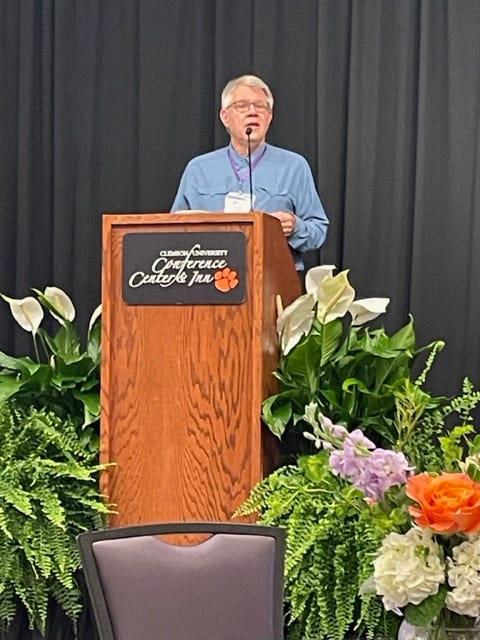International Writing across the Curriculum Conference (IWAC 2023)
WAC for Transitions: The Next 50 Years | Madren Center at Clemson University | June 14-17, 2023
The first IWAC conference was held in 1993 in Charleston, South Carolina. This year, the conference returns to the South for its thirtieth year at the Madren Center at Clemson.
For those who may not know, WAC (Writing across the Curriculum) is a 50+ year old national, transdisciplinary curricular movement devoted to the idea that students learn disciplinary knowledge best and most deeply when they write to learn—that is, when they are continually engaged in the recursive process of writing in the specific genres and language(s) of their disciplines, whether organic chemistry, engineering, business, history, or basketweaving.
When you think about it, the core assumptions behind WAC make perfect sense. If you want to get better at something—and if you want to gain facility and rhetorical flexibility within a given disciplinary language—then you have to actually do it, repeatedly, in iterative stages and with careful feedback and guidance from subject matter experts.
You don’t become a better basketball player by talking about basketball or by watching The Last Dance over and over. You get better at playing basketball by playing it, with expert support from a coach and teammates, and by gradually embodying the fundamentals until they become second nature.
But before I get too far into the weeds, first things first: where did I run on Day 1?
Well, I am staying at a place called Lakeside Lodge, which is on the Seneca side of Lake Hartwell, a large, beautiful lake that separates South Carolina from Georgia and from which the Savannah river flows southward to the Atlantic. On its way, the river passes by my hometown (Aiken, SC) and through the place of my birth (Augusta, Georgia).
All that being said, on Wednesday morning I found my way to campus and did a nice nine-mile run; as I was running by one of the office buildings, I ran into (quite literally) a former student who now works at Clemson—none other than the incomparable Bailey Troutman, late of the University of Colorado (in their PhD program). I think she was shocked to see me—it was a big surprise for me, too!

So here’s a funny story. In 2009, when Clemson hosted the Carolina Rhetoric Conference for the first time—a conference that I co-founded while a graduate student at the University of South Carolina—I presented a paper on austerity and the neoliberal university. (I have to say it: I was writing about neoliberalism before it was cool.) Present at my talk was Lee Morrissey, who at that time was the chair of the English Department at Clemson. I’m not sure if he was sick or had a migraine or what, but for the entirety of my presentation, Lee sat in the back of the room with his head buried in his hands. Every few minutes he would look up long enough to shake his head back and forth, as if he was hearing some dreadful news about the death of a loved one in a fiery collision with a dump truck.
Naturally, as a twenty-eight year old graduate student on the verge of hitting the job market, it was unnerving to see this. And it stuck with me for months afterward. These days, I would think it was just some weirdo having a bad day, but as a young, impressionable academic, it made me a little sick to my stomach.
Who knows what was actually happening with Lee that morning. But of course, I assumed that it was a response to my paper, which I thought was pretty good, though it was critical of faculty and administration and their complicity with the neoliberal austerity policies that were just then coming into play on campuses across the country. Moreover, the paper was written from a graduate student perspective. Let’s recall that this was during the depths of the Great Recession and I was making $12,000 per annum. Thinking about the feelings of tenured faculty at R1 institutions was not at the top of my list of priorities.
This morning, I had the opportunity to return the favor.
Lee gave a talk during the 10:00am session entitled, “I was a Writing Program Administrator, and it was Wack (but not WAC).” The talk was enlightening. In it, Lee discussed the history of Clemson’s rise to national prominence and its status as a top-20 public university (according to the much-maligned US News and World Report rankings), even as the state of South Carolina has repeatedly slashed its state appropriations for public universities since 2002. He mentioned Mark Sanford, the former Republican governor of SC (and avid hiker) who, unbeknownst to me until today, delivered something of an ultimatum to Clemson twenty years ago when he offered to allow the university to become private and take over all its holdings in public lands and facilities in exchange for relinquishing any claims to further financial support from the state. The other option was to accept the severe austerity and budget cuts that have defined the last two decades of higher education in the US (and in the South in particular). Clemson, wisely, opted for the latter. But to even hear that this was on the table was flabbergasting to me.
I’m not going to do my usual run-down of every panel I’ve attended. Instead, I’m going to just hit the high notes.
First, the big ego stroke I received. But this will require some backstory.
In October of last year, I submitted a manuscript to a special issue of The WAC Journal on the next fifty years of WAC work. It was a first draft, but I thought it was pretty good. Well, true to the form of academic publishing, eight months have passed and I haven’t heard any updates since Christmas. (This is fairly typical of academic publishing.) A week or so ago, I emailed Cristyn Elder (University of New Mexico), the guest editor of the special issue just to ask if there were any updates. But, also true to form, I haven’t yet heard anything.

On Wednesday evening, at the opening reception, I was standing in line with some of the biggest names in WAC studies: Doug Hesse (University of Denver) and Kathy Blake Yancey (Florida State)—and (surprise!) Cristyn, who out of the blue said to me, “I think I owe you an email.”
At first I wasn’t sure who she was. Then she turned her name tag around and it hit me.
“I’ve been waiting for the second reviewer to get back to me on your manuscript,” she explained. “And I was hoping that they would get back to me soon so that I could reply to your email with some good news.”
“Well I…”
I sheepishly started to say something like “Don’t worry about it one bit! No problem!”
Then she starts telling me how great my piece is—catnip to any writer. It’s the writerly equivalent of scratching a dog’s belly.
“You have such a great voice,” she says. “I just really like the way your writing moves.”
And she’s laying this on me right in front of two of WAC’s (and rhetoric and composition’s) biggest names. Egads!
So, needless to say, that sort of made my night.
When I got to the front of the line I ordered a pretzel that turned out to be lackluster. Boo.
I’m not going to lie. I needed that pick me up. Working on a book project is such a roller coaster of emotions. Some days you feel like you’re doing brilliant work. Other days you feel like Billy Madison starting school all over again in kindergarten.
Which brings me to the “life updates” section.
Life Updates
I might get accused of burying the lead, but here goes.
I signed a contract to publish my book, The University in Postdigital Culture: Lies, Literacy, and Language with Lexington Books, an imprint of Rowman & Littlefield. I’m thrilled, of course, and also scared half to death.
Kaylin and I have decided to pursue a formal separation. I can’t say too much more about it at this time, except that things are amicable and, of course, I wish her the best of everything in this world and beyond.
I was recently voted in as a board member of Indy Runners. I love this collection of running nerds, and I am honored to be elected to serve.
There may be some other exciting professional news coming soon, but I have to keep a lid on that stuff for now.
Finally, I received this amazing travel mug for participating in IWAC. Check it out.






Macmillan Book Writer is an indispensable tool for aspiring authors and seasoned writers alike. With its intuitive interface and comprehensive features, it streamlines the writing process, allowing users to effortlessly organize their thoughts, craft compelling narratives, and polish their prose to perfection. From its user-friendly interface to its powerful editing tools, Macmillan Book Writer provides a seamless writing experience that empowers authors to unleash their creativity and produce works of literary excellence. Whether you're penning your first novel or refining your latest manuscript, Macmillan Book Writer is a must-have companion for any writer's toolkit.